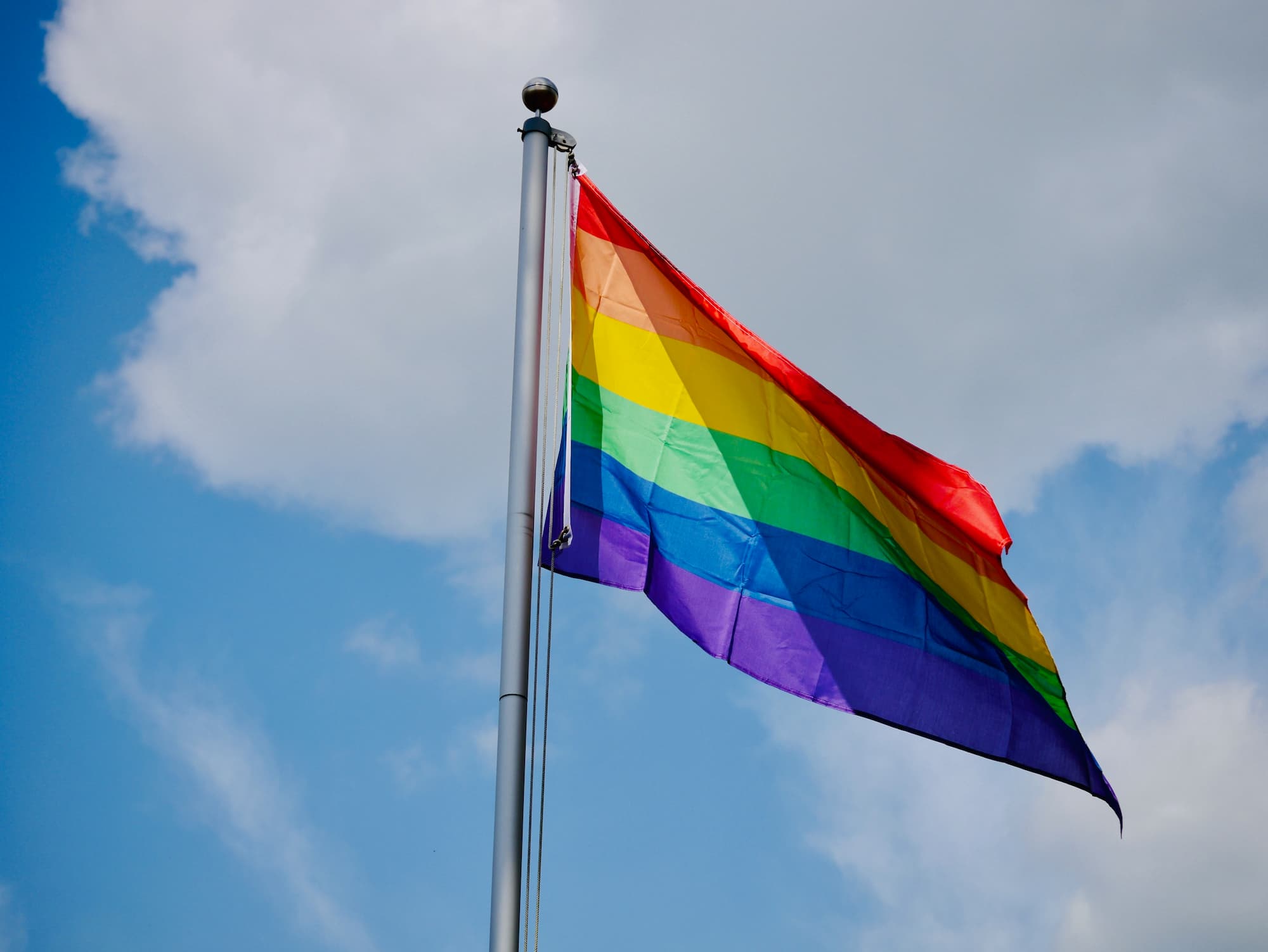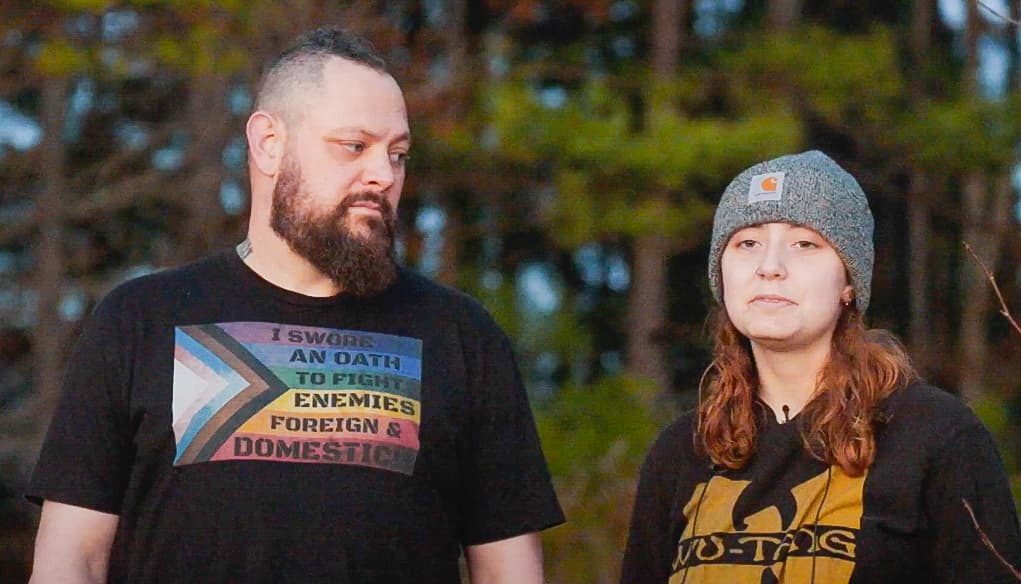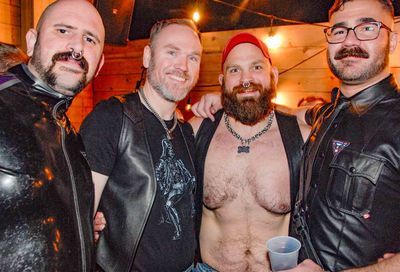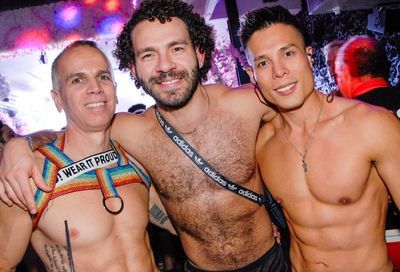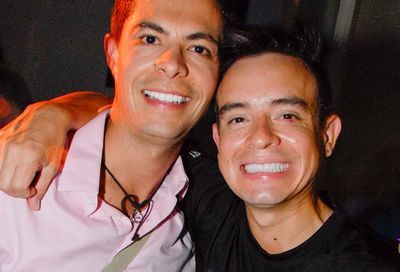Year in Review: The Highs and (many) Lows of 2017
From Trump’s rise to power to battles on every front, the LGBTQ community spent the year fighting back attempts to deny equality.

It’s an understatement to say that the LGBTQ community was sent reeling from Donald Trump’s election in 2016, a year dubbed the “worst in history” because of the negative atmosphere that surrounded many of the year’s major developments. Unfortunately, 2017 seemed to be shaping up to be just as dreadful.
Soon after the president took office, each new day brought a deluge of hostile or harmful actions by the White House and its political allies. As a result, LGBTQ people spent the first part of the year careening from one crisis to another, from “bathroom bills” to threats to cut critical health care programs to an offensive and impractical ban on transgender military members.
We were under constant attack, it seemed — from 1600 Pennsylvania Avenue to Congress to state legislatures to the courts. As a result, LGBTQ advocates, relatively comfortable under the Obama administration, have found themselves on defense for the first time in a while.
By the end of the year, the roles had somewhat reversed, as the LGBTQ community churned out victories in the courts and at the ballot box, culminating in a mini-”blue wave” that saw LGBTQ candidates and allies elected to local offices throughout the country. The resistance, it seems, has finally learned how to fight back.
JANUARY

The LGBTQ community came almost immediately under attack with a so-called “bathroom bill” out of Texas. A major priority of Lt. Gov. Dan Patrick, it sought to restrict which restrooms transgender people were able to use and prevent localities from passing pro-LGBTQ ordinances. Despite numerous attempts by Republicans to pass it, the bill ultimately died at the feet of House Speaker Joe Straus, who opposed it. In Virginia, Del. Bob Marshall attempted to introduce a similarly transphobic bill, but, fearing negative press, the GOP killed it after Gov. Terry McAuliffe threatened to veto.
In the waning days of the Obama administration, former Secretary of State John Kerry apologized for the State Department’s role in discriminating against and purging LGBTQ people during the “Lavender Scare” of the 1950s. And, in a controversial decision, President Obama commuted the sentence of Chelsea Manning, the transgender soldier who was jailed for leaking sensitive military information to Wikileaks. Manning was released from prison in May.

As Inauguration Day moved closer, the LGBTQ community prepared for the worst. The impact was immediate: After Trump was sworn in, the White House erased a page dealing with LGBTQ issues (as well as climate change and women’s rights), a clear message that Trump would not support them. In a bit of poetic justice, however, Trump’s inauguration accidentally contributed to LGBTQ rights: D.C.’s Buttercream Bakeshop donated proceeds from his inauguration cake to the Human Rights Campaign.
The day after the inauguration, the crowds that had turned out for the President were dwarfed by the number of people who participated in the Women’s March. A symbol of the resistance against the Trump administration, it drew more than half a million protesters to Washington, D.C. and almost 3 million more at hundreds of “sister marches” across the world. Those marches set the tone for the rest of the year: with the government pushing Trump’s divisive agenda, 2017 would be a year of resistance.
FEBRUARY
Transgender youth had a rare occasion to celebrate as February kicked off, when the Boy Scouts of America lifted a ban on transgender boys. Later in the year, the group announced it would allow girls to become scouts as well.
Elsewhere, it was a mixture of success and defeat. In D.C., the Council introduced a bill to curb the “gay panic” defense, where someone claims they killed or injured because they were threatened by a person’s sexual orientation or gender identity. However, in South Dakota, LGBTQ activists tried — and failed — to stop a bill allowing adoption and foster care agencies to refuse same-sex couples.

Nationally, LGBTQ activists debated whether they were overreacting to the Trump administration. At one point, the Log Cabin Republicans suggested that the LGBTQ left were “conjuring demons where there are none.” Unfortunately, that blew up in their faces just days later when the Trump administration rescinded Obama-era protections for transgender students. The move, by Education Secretary Betsy DeVos and Attorney General Jeff Sessions, was taken in spite of the fact that a coalition of parents of transgender youth lobbied to keep the guidance in place.
Meanwhile, the Oscars provided some late-month suspense when Moonlight, a coming-of-age drama about a gay black man, won Best Picture — after La La Land was initially and incorrectly announced. It makes Moonlight the first LGBTQ movie to win Hollywood’s highest honor. (Read our full review of Moonlight here.)
MARCH
March was a rough month for the D.C. community. First, it was rocked by news that the number of bias crimes in 2016 had increased since 2015, with most of those committed against the LGBTQ community. Shortly after, LGBTQ community center Casa Ruby had a rock thrown through its glass front door after a man entered and began harassing some of the center’s transgender clients. And across town at the U.S. Capitol, a man stomped on Congressman Alan Lowenthal’s Pride flag, taking offense at its placement next to the American flag.
In a moment of gross hypocrisy, anti-gay Oklahoma Republican State Sen. Ralph Shortey was charged with soliciting sex from a 17-year-old boy after they were discovered by police in a motel room. Shortey later pleaded guilty to child sex trafficking to avoid charges of child pornography and soliciting a minor. Watch police camera footage from the moment Shortey was caught in the motel room here.
In Virginia, Gov. Terry McAuliffe vetoed a bill that would have allowed people to discriminate against LGBTQ individuals, while Kentucky Gov. Matt Bevin signed an almost identical measure into law. But McAuliffe may have the last laugh: Former North Carolina Gov. Pat McCrory complained that he was having trouble finding a job, after supporting the anti-trans HB 2 “bathroom bill.”
APRIL

Speaking of HB 2, North Carolina Gov. Roy Cooper and Republican leaders agreed to “repeal” it, while keeping some of its anti-LGBTQ provisions in place. As a result, the NCAA returned sports championships to North Carolina and the business community stopped penalizing the state. Unfortunately, localities are barred from passing their own pro-LGBTQ ordinances until December 2020, and bathroom restrictions for transgender people will remain in place for the foreseeable future. Hardly a resounding victory.
A huge win came after the 7th U.S. Circuit Court of Appeals agreed to hear lesbian professor Kim Hively’s lawsuit against Ivy Tech Community College. They ruled the college had discriminated against her because of her sexual orientation, marking the first time a federal court has found LGBTQ people should be protected at work under Title VII of the Civil Rights Act.
In Virginia, Democrat Jacqueline Smith became Prince William Circuit Court Clerk, replacing recently departed Michele McQuigg, a Republican who argued that Virginia’s ban on same-sex marriage should be upheld. Meanwhile, the Virginia Supreme Court threw out a lawsuit attempting to overturn the Fairfax County School Board’s pro-LGBTQ nondiscrimination policy, and Gavin Grimm, the trans student who sued his Virginia school board over its anti-LGBTQ attitudes, was named one of Time’s “Most Influential People of 2017.”

Perhaps the biggest political story of April was the confirmation of Supreme Court Justice Neil Gorsuch. After Democrats tried to block, Republicans exercised the “nuclear option” and killed Senate filibusters, and Gorsuch, who has an anti-LGBTQ record, was ultimately confirmed. It swung the nation’s highest court back into conservative hands.
Globally, human rights advocates highlighted the imprisonment, torture, and killing of men and women suspected of being LGBTQ in the Russian republic of Chechnya. As the death toll rose, and a number of first-hand reports from victims came to light, U.S. politicians began speaking out against the abuses. U.S. Ambassador to the United Nations Nikki Haley condemned the anti-LGBTQ persecution, as did Florida Sen. Marco Rubio and the State Department (though not Secretary of State Rex Tillerson directly). LGBTQ groups, including GLAAD, began demanding that the Trump White House acknowledge the crisis. Amid Trump’s silence, former Vice President Joe Biden and former Secretary of State Hillary Clinton spoke out, with Clinton echoing her famous line that “gay rights are human rights.”

The rest of April wasn’t much better. Republican Sen. Mike Enzi apologized after suggesting that violence against gender-nonconforming people was acceptable, saying that a man who gets beat up for wearing a tutu “is asking for it.” Millions watched as a Survivor contestant was publicly outed as transgender by a disgruntled castmate. Bill O’Reilly, who spent years seeding anti-LGBTQ stories on FOX News, was fired for sexual harassment. And, closer to home, an executive producer of Capital Pride was forced to resign after activists uncovered a blog post criticizing Democrats’ reliance on social issues, including transgender restroom use, in the 2016 election.
MAY

In May, activists prepared for a “religious freedom” executive order that would legalize anti-LGBTQ discrimination, but it failed to materialize. Instead, Trump directed the IRS to be more lenient on churches that inject themselves into the political arena, fueling speculation that First Daughter Ivanka Trump had helped scuttle a much more harmful order. Another “win,” as it were, came when Trump’s nominee for Secretary of the Army, Mark Green, withdrew after comments he made saying transgenderism was a “disease” and disparaging the idea of allowing transgender people to serve openly in the military.
As Trump remained silent, world leaders continued to speak out on the alleged persecution of LGBTQ people in Chechnya, including British Prime Minister Theresa May, German Chancellor Angela Merkel, and French President Emmanuel Macron. The Chechen government was accused of encouraging families to carry out “honor killings” of LGBTQ relatives — in one instance, a gay teen was reportedly thrown from a building after his family discovered he was gay. And Chechen leader Ramzan Kadyrov continued to deny not only that any persecution was going on, but that there were even any gay people in Chechnya.
JUNE

June brought Pride Month and a host of celebrations for the LGBTQ community. In a show of support for Pride, D.C. installed temporary rainbow crosswalks and permanent rainbow signpost banners on 17th Street NW. On the morning of the Capital Pride Festival, thousands took to the streets for the March for LGBTQ Equality, a national event to protest the Trump administration’s targeted attacks on the community. Saturday evening’s celebratory Capital Pride Parade, however, was cut short when No Justice, No Pride — a group of grassroots activist urging, among other things, Pride cut its ties with corporate sponsor Wells Fargo — successfully disrupted the route, and forced several spontaneous reroutings.
Sadly, on Pride weekend, longtime D.C. Councilmember and former head of the Whitman-Walker Clinic Jim Graham passed away. And in another blow to the local community, Town Danceboutique, a longtime staple in the D.C. nightlife scene, announced that it would close on July 1, 2018. And, continuing his trend of erasure, President Trump’s White House broke with tradition and failed to issue a proclamation recognizing June as LGBTQ Pride Month.

However, other developments seemed to show signs of progress for the LGBTQ community. The European Court of Human Rights ruled that Russia’s “gay propaganda” law was discriminatory. Germany legalized same-sex marriage and adoption. The U.S. Supreme Court found that same-sex parents have a right to be recognized as legal parents and have their names listed on their children’s birth certificates. And the D.C. Department of Motor Vehicles began issuing licenses with a non-binary gender option.
JULY
In July, Republicans failed to repeal the Affordable Care Act, a relief to LGBTQ advocates who had held rallies and sit-ins at congressional offices to protest the repeal. Similarly, House Republicans failed to insert an anti-transgender amendment into the annual defense bill, which would have banned the military from paying for transition-related healthcare for transgender troops. However, any celebration ended just days later.

President Trump shocked the world when he tweeted that transgender individuals would be banned from serving openly in the U.S. military. Trump justified the ban by citing the costs of transgender health care — which he falsely claimed were exorbitant — and alleging problems associated with accommodating transgender individuals.
In response to an onslaught of anti-LGBTQ actions by the Trump White House, the Human Rights Campaign announced a multi-million dollar campaign, HRC Rising, to push back against the administration, particularly anything that could endanger LGBTQ people’s health, security, or well being.
Some good news in July came from the scientific community, after a study of serodiscordant couples found that being “undetectable” — or, regularly taking antiretroviral medicine to suppress the HIV virus — “effectively prevents” transmission to an HIV-negative partner. It represented a landmark moment in the fight against HIV.

AUGUST
August brought disturbing news about the mental health of LGBTQ young people, with statistics showing spikes in calls to suicide hotlines following the Trump administration’s anti-LGBTQ actions. One in four D.C. teens has attempted suicide, highlighting the urgent need for interventions and support services.
The month’s downward trend continued when, in unthinkable scenes, right-wing and white supremacist groups engaged in violent confrontations with counter-protesters in Charlottesville. One woman was killed and 19 people were injured after an alleged Nazi-sympathizer deliberately plowed his car into a crowd.
Anti-LGBTQ forces, emboldened under Trump, sued the Southern Poverty Law Center for calling homophobic conservative organizations “hate groups.” Mat Staver, head of the conservative legal firm Liberty Counsel, claimed that right-wing groups are under attack, and, incredibly, compared their plight to Jews who lived in Nazi Germany.
Locally, one of the men involved in the slaying of transgender woman Keyonna Blakeney in a Rockville hotel room was sentenced to 30 years in prison. Meanwhile, Karen Keys-Gamarra, a pro-LGBTQ candidate, won an open seat on the Fairfax County School Board, replacing Jeanette Hough, who had won the seat by campaigning against the district’s pro-LGBTQ nondiscrimination policy.
SEPTEMBER

In a surprising move, President Trump nominated Richard Grenell, an openly gay man, to be U.S. ambassador to Germany. Unfortunately, Grenell’s nomination was overshadowed by the Department of Justice supporting business owners who want to discriminate against gay people and same-sex weddings, such as Jack Phillips, a baker at Masterpiece Cakeshop in Lakewood, Colo., who violated Colorado law when he refused to bake a cake for a gay couple’s wedding in 2012.
The LGBTQ community nationwide mourned the death of longtime LGBTQ rights activist Edie Windsor, who was at the center of the landmark Supreme Court case that found part of the Defense of Marriage Act unconstitutional. In an unplanned yet fitting tribute to Windsor’s efforts, more than 100 corporations expressed their support for the Equality Act, a bill that would amend the Civil Rights Act to include LGBTQ people.
In another HIV breakthrough, scientists announced that research into a new antibody could eventually lead to a vaccine. And a second study found that pre-exposure prophylaxis, or PrEP, is safe for use by teenage gay and bisexual males — two groups most at risk of contracting HIV.

September also brought a rush of fall TV premieres and a loud declaration from talk show host Ellen DeGeneres, who called President Trump “dangerous” and said she would not allow him to appear on her show. Elsewhere on NBC, landmark gay sitcom Will & Grace returned to the air after eleven years, picking up two Golden Globe nominations and a renewal through the 2018-19 season. Meanwhile, new ground was broken when Star Trek: Discovery actors Anthony Rapp and Wilson Cruz became the first on-screen gay couple in a Trek franchise.
OCTOBER
This was the month that rocked the entertainment world, as Hollywood mogul Harvey Weinstein was brought down by a string of sexual harassment and assault allegations. The #MeToo social media campaign highlighted the widespread nature of the problem, and the nation watched as sexual misconduct allegations were brought against politicians, directors, actors, and other celebrities. The LGBTQ community was not immune: Star Trek’s Anthony Rapp accused House of Cards star Kevin Spacey of sexually harassing him when he was fourteen. Spacey apologized, saying he did not remember the incident, and attempted to deflect by coming out as gay, which outraged LGBTQ people, who accused him of playing into stereotypes of gay men as predators and pedophiles. Soon, other stories of harassment and assault emerged against the actor, and Netflix ultimately sacked Spacey and refocused the show’s sixth and final season on Robin Wright.

The news cycle diverted from Hollywood’s scandals when America was once again rocked by a mass killing, after 64-year-old Stephen Paddock opened fire on a country music concert from the balcony of his Las Vegas hotel, killing 58 people. Bobby Eardley, whose lost his boyfriend Cameron Robinson, captured the senselessness and loss of the event, detailing how he comforted Robinson in his final moments in an emotional interview with CNN’s Anderson Cooper.
Undeterred by sexual assault scandals and a national tragedy, President Trump continued to court anti-LGBTQ groups, becoming the first sitting president to attend the right-wing Values Voters Summit. The White House also came under fire when The New Yorker claimed Trump had joked about Vice President Mike Pence wanting to “hang” every gay person. The White House denied it.

Meanwhile, the Trump administration was reprimanded by a federal judge in D.C. for attempting to ban transgender people from the military, stopping the effort until the case is resolved. In subsequent months, two other federal judges in Maryland and Washington State issued their own orders to stop the ban from moving forward. Unfortunately, Trump fought back, issuing “religious liberty” guidance that gives more leeway to employers who wish to deny healthcare to subsidize behaviors, such as homosexuality, to which they have moral or religious objections.
Finally, D.C. lost out on a bid to host the 2022 Gay Games. Hong Kong will instead welcome the sporting event, which attracts LGBTQ athletes from around the world.
NOVEMBER
November began with yet another Trump scandal, as Sam Clovis, Trump’s nominee for head scientist at the U.S. Department of Agriculture, withdrew after comments he made arguing that homosexuality is a choice and equating gay marriage to endorsing pedophilia. Elsewhere in the city, gun reform group Gays Against Guns held a “die-in” at the U.S. Capitol building, calling on Congress to take action in the wake of a deadly church shooting in Texas. Eight members of the group were arrested by Capitol Police.
The month also marked a high point for the LGBTQ community, as pro-LGBTQ Democrats, including several transgender candidates, won elections across the country. In Seattle, Jenny Durkan became the country’s second lesbian mayor of a major U.S. city. In Minneapolis, voters elected transgender candidates Phillipe Cunningham and Andrea Jenkins to the City Council.

In Virginia, Danica Roem unseated Virginia’s self-titled “chief homophobe” Bob Marshall. Roem’s victory came amid a wave of Democratic victories over a number of anti-LGBTQ Republicans in the state. And the victories of Ralph Northam, Justin Fairfax, and Mark Herring for the state’s top three offices means that, for the next few years, Virginians will be represented by an administration supportive of LGBTQ rights — the perfect cherry on top of the proverbial political sundae.
In Australia, voters chose overwhelmingly to approve gay marriage in a nationwide postal survey, prompting lawmakers to officially legalize same-sex unions the following month.
The nation’s attention turned to Alabama this fall, as Republican Senate candidate, former Alabama Supreme Court Justice, and notorious racist and homophobe Roy Moore was accused of molesting a 14-year-old girl while in his 30s. The revelations caused a political firestorm, with Republicans first abandoning Moore, then returning to support him after Trump threw his support behind him. However, the accusations proved insurmountable, and he (and Trump) ultimately lost in a stunning, nail-biting upset to pro-LGBTQ Democrat Doug Jones, whose son publicly came out as gay following the win.
Further hypocrisy from the “family values” Republican party came when anti-LGBTQ Ohio State Rep. Wes Goodman resigned after being caught having sex with a man in his office. After his resignation, he was accused of sexual harassment by dozens of men who claimed he tried to seduce them.

Allegations of sexual harassment and sexual misconduct also continued to make headlines in Hollywood, with Jeffrey Tambor, star of Amazon’s Transparent, quitting the show after being accused of sexually harassing two transgender actresses on set.
Even adult entertainment wasn’t safe from controversy. Gay performer Hugh Hunter declined nominations for three GayVN awards, calling out the industry for its “racism and bigotry” after the awards segregated actors of color into their own category. In what could possibly be the best illustration of Hunter’s point, a Justice League gay porn parody came under fire for replacing Cyborg, a black character, with the Green Lantern, played by a white actor who is a fervent Trump supporter.
DECEMBER
Dec. 1 marked World AIDS Day, and, true to form, the Trump omitted LGBTQ people from his World AIDS Day proclamation. LGBTQ advocates accused the White House of erasing the unique impact the disease has on the LGBTQ community, but the Log Cabin Republicans defended it, claiming it separated HIV detection and treatment from identity politics.
December was a busy month for the Supreme Court, which had to decide the fate of several LGBTQ-related cases. It ultimately refused to hear a lawsuit over whether the city of Houston can offer benefits to spouses of LGBTQ employees and refused to hear the appeal of Jameka Evans, a Georgia security guard who claimed she was fired from her job because of her sexual orientation and refusal to adhere to typically “female” norms. That latter decision introduces some uncertainty over whether federal law protects LGBTQ people from discrimination.

Instead, the Supreme Court heard oral arguments in the Masterpiece Cakeshop case over whether anti-gay discrimination is allowed for those who engage in so-called “creative” fields, like custom-cake designers. Supporters of Jack Phillips, the Colorado baker at the center of the case, and supporters of Charlie Craig and Dave Mullins, the couple he turned away, held dueling rallies on the steps of the court while lawyers argued the case inside.
Later that day, White House Press Secretary Sarah Huckabee Sanders told reporters that President Trump supports allowing businesses to put up signs saying, “We don’t bake cakes for gay weddings,” confirming what many had suspected all year long: Trump doesn’t care about the LGBTQ community.
In entertainment world, director Bryan Singer was accused of sexually assaulting a 17-year-old boy in 2003, forcing the youth to engage in oral and anal sex in exchange for promising help with his acting career. On a more positive note, critically acclaimed gay romance Call Me By Your Name scored three Golden Globe nominations for Best Drama, Best Actor, and Best Supporting Actor, and its extraordinary young star, Timothée Chalamet was nominated for a Screen Actor’s Guild award.

Back at home, LGBTQ community center Casa Ruby was attacked for the third time this year, when a masked assailant entered the center and sprayed mace in the face of a transgender client. Metropolitan Police are still investigating the case and are searching for the suspect.
And that, in a nutshell, sums up 2017. A constant back and forth between Donald Trump and the Republicans, who are hellbent on taking us back to a straight, white, male-focused vision of America, and the LGBTQ advocates desperate to cling onto and maybe advance what rights we currently have. But with a string of late-season wins and the Mueller investigation working its way into Trump’s inner circle, perhaps 2018 will be the year we, as a community, claw our way back from the brink. It can’t be any worse than 2017. Can it?
Rhuaridh Marr contributed to this report.
Support Metro Weekly’s Journalism
These are challenging times for news organizations. And yet it’s crucial we stay active and provide vital resources and information to both our local readers and the world. So won’t you please take a moment and consider supporting Metro Weekly with a membership? For as little as $5 a month, you can help ensure Metro Weekly magazine and MetroWeekly.com remain free, viable resources as we provide the best, most diverse, culturally-resonant LGBTQ coverage in both the D.C. region and around the world. Memberships come with exclusive perks and discounts, your own personal digital delivery of each week’s magazine (and an archive), access to our Member's Lounge when it launches this fall, and exclusive members-only items like Metro Weekly Membership Mugs and Tote Bags! Check out all our membership levels here and please join us today!




